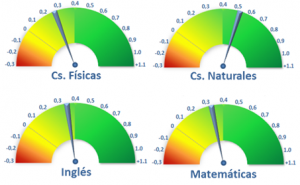Implementing institution: IkamvaYouth
Country: Sudáfrica
Source: Fundación Telefónica
Execution period: 2003 - in progress
Plataforma de Prácticas Efectivas:
To reduce fundamental skills gaps, so that disadvantaged young people can have access to tertiary education and/or decent employment.
Reinforcement and vocational guidance tutoring for vulnerable young people.
The program allows an increase of 0.29 SD in the skills of participants in Physical Sciences, while 0.53 SD in Natural Sciences, 0.36 SD in English, and 0.33 SD in Mathematics.
Ikamva Youth is a tutoring program for vulnerable secondary school students to help them develop a professional career. The initiative is the product of the collaboration of Joy Olivier and Makhosi Gogwana, two researchers from the Human Sciences Research Council (HSRC) and is sponsored by Coca-Cola, Omidyar Network, Montpellier Foundation, The Elma Philanthropies, among others.
The methodology focuses on a set of articulating principles that are: a culture of accountability to self and peers, horizontal collaboration, results-based management, integrity and sincerity. Participants enter the program from the penultimate year of high school. Activities take place outside school hours, usually in the afternoons, on Saturday mornings and during holidays. To stay in the program, youth must attend at least 75% of the sessions.
A first modality is in individual tutoring after classes, where students have support for their homework. The tutor pays particular attention to the student’s ability to handle essential concepts at the secondary level. In addition, Ikamva Youth has launched an online platform called “Operation Fikelela” that provides students with several tutorials for basic computer skills. As well, sessions are held every two weeks in small groups led by a moderator. The different branches of the professional world, the existing university degrees and the scholarship system are dealt with here. These sessions are part of the “Media, Image and Expression program (MIE)” which aims to encourage young people to exchange their views and visions of the world. The sessions are complemented by a large annual event “Annual Careers Indaba”, during which professionals tell their experience.
The system is maintained by the principle of ‘paying back’ which means that former students accessing tertiary institutions return to the program as tutors. Thus, more than half of the tutors involved are alumni of the program; while the other party is made up of local professionals, all volunteers. In 2014, the IkamvaYouth program launched a major intersectoral alliance, the Community Collaboration Program (CCP), to create spaces for exchange and extend the program to other regions.
Given the segregation that existed in South Africa for decades, society was strongly segmented into social groups. Black people are concentrated in vulnerable neighbourhoods (townships) where student performance is lower than the national average. At the country level, only 60% of black students pass the final exam at the secondary level, while 99.6% of whites do pass. Considering that only 10% of students manage to enter university, those are mostly of white origin. The black groups of the population face several barriers to perform in their professional life, which ultimately generates withdrawal behaviours or low level of their expectations.
In 2015, the Research on Socio-Economic Policy (RESEP) carried out an experimental study with a control group in order to measure student progression in terms of English, Mathematics, Literature and Science. Students who achieved the same result in the 9th grade national exam were selected. For one year, the intervention group received the program, while the control group did not.
Comparison of progress has revealed an increase of 0.29 SD in Physical Sciences, 0.53 in Natural Sciences, 0.36 SD in English, and 0.33 in Mathematics. Considering that a SD of 0.30 represents a year of progress (Spaull & Kotzé, 2015: 20), it can be said that the IkamvaYouth program tends to increase the learning of students between 1 and 1.5 years.
The annual costs per student are estimated at US$375, so the program is quite cost-efficient. It is an interesting opportunity for countries with the same problems.
Impact of interventions:

Charts: Impact measured in standard deviations of the intervention group compared to the control group.
Link: http://ikamvayouth.org/
Contacto: http://ikamvayouth.org/contact
Report: Ver informe
Other documents: Ikhama.pngYkamva-e1494202959849.jpg
Tags: